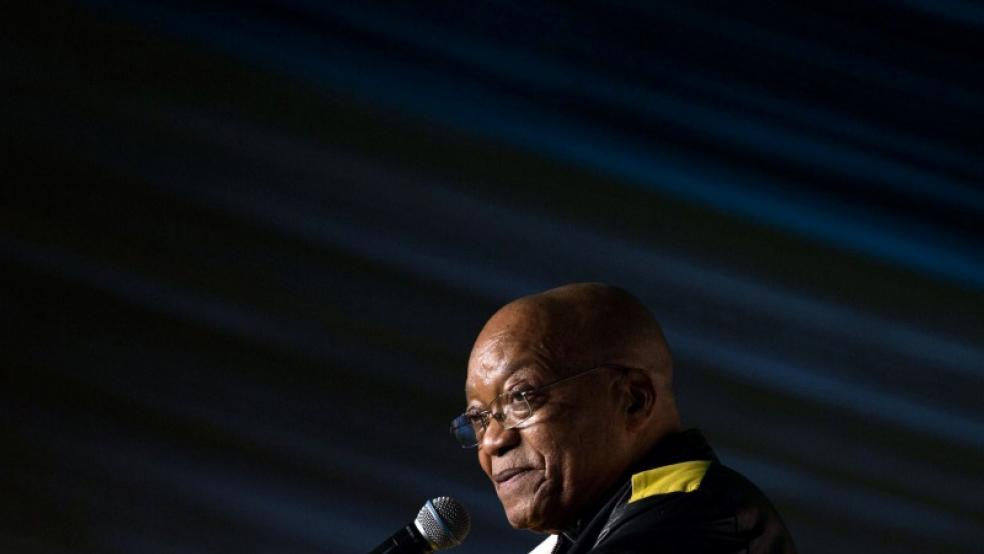LONDON (Reuters) - President Jacob Zuma's exit, whenever it comes, will be no panacea for South Africa's deepening political problems which many investors blame on the ruling ANC party rather than its 75-year-old leader.
South Africa is a key emerging economy, with a $140 billion bond market and a $825 billion equity market that is often used by global investors as a springboard for exposure to the rest of the continent via bank, telco and retail shares.
Their money in turn is key for Africa's most industrialized economy which relies on these inflows to plug its problematic balance of payments deficit, standing last year at 3.3 percent of annual economic output.
However, the struggles convulsing the governing party have come into sharp focus since Zuma sacked his respected finance minister, Pravin Gordhan, last month unleashing a wave of street protests and calls from disenchanted voters and the biggest trade union for him to step down.
The turmoil sent the rand
tumbling 10 percent and cost the country its valuable investment grade rating, though thanks to a generally benign emerging markets backdrop, South African markets suffered less near-term pain than expected. But while Zuma, whose presidency has been beset by corruption allegations, has so far weathered the latest challenges to his leadership, few believe that a lasting recovery or policy reforms will follow his eventual departure."Market participants look at South Africa and see things through a lens of cyclical patterns, the standard ups and downs of a business cycle. I look at it through the lens of structural decline," said Michael Cirami, co-director for global fixed income at fund manager Eaton Vance."There are some very deep, profound issues which need to be articulately addressed - time is running out," said Cirami, who has little allocation even though South Africa comprises a tenth of the most-used emerging debt index, the GBI-EM.RISING INEQUALITYIn his decade in office, Zuma has overseen an economy where growth will slow to 0.8 percent this year, according to the International Monetary Fund, youth unemployment tops 50 percent and key labor and infrastructure reforms languish.Zuma will step down as head of the African National Congress (ANC) in December but his presidential term only expires after 2019 elections. The two favorites to replace him as president are ex-wife Nkosazana Dlamini-Zuma and current deputy president Cyril Ramaphosa, both ANC stalwarts.The 105-year old ANC has ruled virtually unopposed since white-minority rule ended in 1994 and despite a setback in last year's local elections there is little sizeable opposition. Powerful trade unions allied to the ANC have repeatedly blocked efforts to reform labor and land laws.Unemployment and sluggish growth are exacerbating inequality. In 2015, black South Africans earned roughly a fifth of their white counterparts. Protests over cost of education, water and electricity have increased, as has crime..Investors' main fear is the ANC will lurch to the left to appease radical elements rather than undertake painful reform.New finance minister, Malusi Gigaba, has announced plans to redistribute wealth in the economy to poor black people as part of a program of "radical socio-economic transformation" promised by Zuma. Meanwhile Zuma himself has renewed his promise to change the constitution and allow the expropriation of land without compensation.."It's a consequence of a political party that's been in power too long: It produces immoral people who are out to serve their own interest, it's become a party which is taking power for granted," said Jan Dehn, head of research at asset manager Ashmore Investment Management. "I don't see this changing even if Zuma goes and Ramaphosa comes in."INSTITUTIONSSouth Africa has positives: Relatively low debt, an active domestic investor base and corporate governance standards among the highest across emerging markets. Unlike many peers its central bank is independent and highly credible, its balance of payments deficit has narrowed recently: http://tmsnrt.rs/2fM78iHAccording to Mathieu Negre, an emerging equity portfolio manager at Swiss firm UBP, reconciling the discrepancy between a weak economy and strong corporate sector is already a headache.While the government has rejected calls to nationalize banks and mines, that fear still lingers, Negre said. Already underweight, he says "the next move is probably to move more underweight".Furthermore, South Africa's vaunted institutional strength may also be at risk and replacing Gordhan with a more pliant Gigaba raises the prospect of looser budget purse-strings.The redistribution focus may start with the current cabinet via more intervention in the private sector through the Public Investment Corporation (PIC) - a major shareholder in a majority of South African listed bluechip firms, predicts John-Paul Smith, founder of the Ecstrat consultancy. "If Zuma's ex-wife Nkosazana Diamini-Zuma becomes the new leader, the ANC is likely to fight the 2019 presidential election on a racially-based agenda around the redistribution rather than the creation of wealth," Smith said.That would be a huge setback for South Africa's equity market, where foreigner hold around one third of stocks. "Policy is going to get pulled to the left," Cirami said. "I fear and worry we will need to see a more meaningful collapse in the economy to get a rethink on what is the best path forward." (Additional reporting by Mfuneko Toyana in Johannesburg; Editing by Richard Lough)



